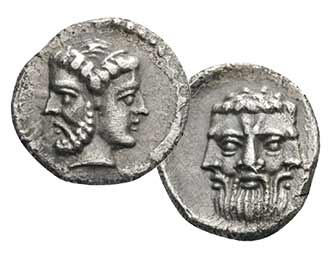BlockProf
Crypto Financial Privacy, Roman God Janus, Spider Brains, Coffee Baristas
Dear loyal BlockProf subscribers:
I’ve been away for awhile. I am writing a book about crypto privacy. Crypto privacy coins and crypto privacy tools have over $6 billion invested and stored in them in the middle of the current crypto bear market, that alone makes them an interesting topic for a book.
I am particularly excited because I have an agent! And not just some random guy on the internet. He repped the author of Bad Blood, a book by the WSJ reporter who single-handed took down Theranos, that was later made into a Netflix special.
Before I tell you more about my book, first let me tell you about my favorite Roman deity, the god Janus. Janus was a god with two faces.
That’s not a pejorative, Janus wasn’t a liar. Janus represented the inherent duality of the world. Beginnings and endings. Janus had a role in rituals that started wars and ended wars. Also the god of doors and transitions.
Janus was often minted on early Roman coins. Part of the legend of Janus was that he minted the first Roman coin. Which makes sense, because a coin has two sides.
Duality is a common theme in religions (Taoism, Christian heaven/hell) and in human perception generally. Light/dark, right/wrong, left/right.
We often say there are “two sides to every story.” It is not unrelated that there are two distinct hemispheres in the human brain and our bodies have a dual symmetry.
If we had evolved from spiders instead of monkeys, no doubt we would repeat the conventional wisdom that “there are clearly eight sides to every story.” I think the spiders have a better handle on the intricate web of truth.
But let’s get back to the themes of duality, money, and crypto privacy.
I want to write a book. The “write anything interesting, for dummies” guidance suggests that humans like to read about conflict and they think in a dual way.
I have found my dual conflict to motivate the book: the two faces of crypto privacy.
That on the one hand financial privacy is a fundamental human right, a right that links to every other fundamental human right.
Consider if someone spends money at a gay bookshop, who is not yet public about their orientation, or buys a gun for self defense and wants to maintain the privacy of that purchase. Financial privacy is an issue that has no clear political side.
We take financial privacy for granted until we lose it, and when you lose it it’s hard to get it back (and hard to think about anything else).
On the other hand, really bad people use financial privacy to do really bad things. They have long done so with cash, they will do so with crypto privacy tools.
Wired has a story about how law enforcement took down a global child pornography ring because all of the participants in the scheme used bitcoin purchased on regulated crypto exchanges and seemed to take no steps to maintain their privacy in crypto transactions.
Investigations like that one will become much harder as crypto privacy tools described in my book become more widely adopted.
There are two sides to the crypto privacy coin.
I hope Janus would be proud of my book. Or perhaps on point, dually proud and disappointed at the same time.
Blockchains like bitcoin are a fascinating innovation that might replace our existing payment system. Yet bitcoin is a fundamentally public blockchain.
The goal of bitcoin is to replace money, yet if you spend bitcoin at a coffee shop the barista knows your public key. That matters, a lot.
Bitcoin is like Visa or bank wires in that it can move value. It is better than both of those tools in one way, in that it can do so faster and cheaper. It is worse than both, in that it is not private, it is public.
Once your coffee shop barista knows your public crypto key, they can then lookup online (for that wallet) your crypto net worth and everything you have ever spent crypto money on.
This can get scary fast. A recent DOJ indictment tells a story about attempted kidnappers who learned about a bitcoin investor early, and lucky, in bitcoin who had a high bitcoin net worth. The kidnappers hatched a plan to break into their home and torture them to get their bitcoin.
On the other hand, crypto privacy tools are used to buy and sell illegal drugs online. And as these tools gain general adoption, they will eventually be used to hide money from courts and government agencies.
The old “swiss bank account” mode of hiding wealth from tax administrators, divorce courts, bankruptcy courts, or civil tort litigation was difficult and expensive, and has now largely disappeared. Crypto privacy tools make that mode of hiding wealth cheap and readily available with a download on your phone.
The legal and forensic accounting system in the United States has become lazy in its dependency on readily available (and subpoena-able) records of financial history in bank accounts and credit cards. That will change soon, the change will be fast, and this book describes how that will happen.
Along the way I will teach users about the leading crypto privacy tools, how to use them, and the fascinating stories behind them.
Crypto tokens like ZCash and Monero.
Bitcoin privacy tools like Samourai wallet that facilitate private bitcoin coinjoin transactions.
I have experienced a dual internal conflict in planning to write this book. If I write a book about how to completely hide your money, using crypto, I will teach dissidents in dictatorial regimes how to secure their wealth. I will teach all of us how to spend crypto at the coffee shop but avoid the snooping barista problem.
I will teach abused spouses how to hide money from domineering partners. I will teach disfavored parties how to regain access to a means of commercial payment as the traditional banking system becomes an increasingly politicized and “cancel culture” friendly platform.
I am proud to think about those outcomes from this book.
I will also simultaneously teach bad people how to do bad things. Some grey areas, some really bad. Like really bad.
Crypto privacy die hards will accuse me of being a “narc” for teaching forensic investigators about how these tools work in this book. Yet crypto forensic investigators working at the Treasury Department and the FBI have already warned me in discussions against writing this book, even while they express curiosity about the analysis within it.
You can say it is a book about how to maintain the fundamental human right of financial privacy as crypto starts to replace both the bank digital payment system and replace cash. You can say it is a book about how to conduct criminal transactions online, or how to cheat on taxes or effectively hide assets in divorce or bankruptcy court. You can also say it is a book about how to conduct forensic investigations of all of the above.
This book is all of those things.
We return to Janus. The Roman god of duality, and transitions, and frequently appearing on ancient Roman coins as the Roman economy transitioned to hard money.
When this book about crypto privacy is published, I hope you like it. Or more accurately, I hope you dually enjoy it and feel frustrated by it at the same time.









Looking forward to the book!